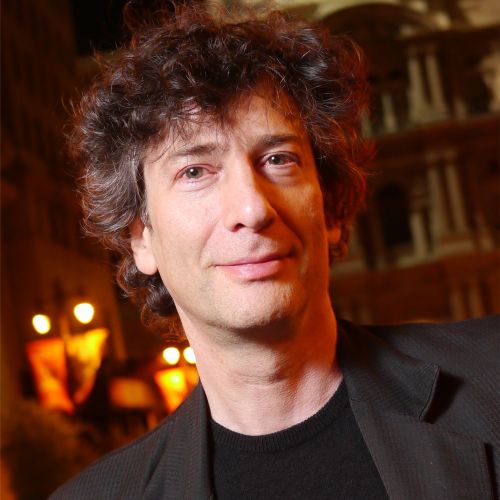Neil Gaiman
Introduction
Neil Gaiman, born on November 10, 1960, in Portchester, Hampshire, England, is one of the most celebrated storytellers of the modern age. Known for his ability to blend myth, fantasy, and reality, Gaiman has built a vast literary universe that includes novels, graphic fiction, children’s books, and screenplays. His distinctive style combines dark whimsy with deep human emotion, redefining how ancient myths are retold in modern times. Often described as a modern mythmaker, Gaiman’s stories bring forgotten gods, timeless archetypes, and magical worlds into contemporary settings that continue to captivate readers around the world.
Area of Expertise
Neil Gaiman’s expertise lies in the reinterpretation of mythology and the creation of original mythic narratives. He has a lifelong fascination with ancient stories, particularly Norse, African, and classical mythologies. Gaiman has often said that myths are the “compost” from which new stories grow, and this philosophy is evident throughout his work. Rather than simply retelling old tales, he reshapes them to explore how ancient gods and heroes might exist in today’s society.
In American Gods, Gaiman imagines a world where deities from every belief system coexist and struggle for survival in modern America. His deep engagement with Norse myths led to his 2017 book Norse Mythology, which reimagines the tales of Odin, Thor, and Loki while maintaining their ancient spirit. Similarly, The Sandman, his groundbreaking comic series, weaves together figures from mythology, literature, and history into a narrative about dreams and storytelling itself. Through his works, Gaiman demonstrates how myth continues to evolve as part of human culture and imagination.
Books & Publications
Neil Gaiman’s bibliography reflects his versatility and his mastery of mythological storytelling. His works span multiple genres, from dark fantasy to children’s literature, and have achieved both critical acclaim and commercial success.
The Sandman (1989–1996) remains one of his most influential creations. This series revolutionized the comic book industry by merging mythology, philosophy, and horror into an intricate saga about Dream, one of the Endless. It is credited with elevating comics into serious literary art and has won numerous awards.
In 1990, Gaiman collaborated with Terry Pratchett on Good Omens, a humorous and satirical story about the apocalypse. The novel’s success led to a popular television adaptation for which Gaiman served as a writer and producer. Neverwhere (1996) expanded on his BBC television series, creating a dark and magical version of London known as “London Below.”
His novel American Gods (2001) remains a cornerstone of modern fantasy. It explores themes of faith, belief, and identity while reimagining old gods in a world dominated by new ones. The book earned him the Hugo, Nebula, and Bram Stoker Awards. Coraline (2002), written for younger readers, tells a darkly whimsical story about a girl who discovers an eerie parallel world. The novel was later adapted into a successful stop-motion film.
Other major works include Anansi Boys (2005), which draws on West African folklore, The Graveyard Book (2008), which reworks Rudyard Kipling’s The Jungle Book in a Gothic setting, and The Ocean at the End of the Lane (2013), a haunting tale about memory and imagination that won the British Book of the Year Award. Norse Mythology (2017) collects retellings of classic Norse stories in a voice that feels both ancient and fresh. Across all his books, Gaiman’s storytelling captures the timeless power of myth in the modern world.
Research & Contributions
Neil Gaiman’s contribution to literature extends beyond storytelling. He has played a crucial role in reviving interest in mythology and exploring how ancient narratives can be made relevant today. His works are frequently studied in academic circles for their engagement with mythic structure, archetypes, and the psychology of storytelling. Gaiman’s stories often reference the theories of Carl Jung and Joseph Campbell, especially regarding the collective unconscious and the hero’s journey.
In The Sandman, Gaiman draws from multiple mythological sources, blending them seamlessly with historical and literary figures to create a postmodern narrative about the nature of dreams and creation. American Gods uses mythology as a metaphor for cultural identity and belief in a changing world. His writing often blurs the line between fantasy and social commentary, using myth to explore issues such as globalization, consumerism, and alienation.
Gaiman’s influence is also felt in the comic book industry, where he helped elevate the medium’s literary credibility. He has advocated for creators’ rights, ensuring that authors and artists maintain ownership of their work. His essays and lectures on storytelling, literacy, and imagination have inspired writers and readers alike. Adaptations of his work, including Good Omens, The Sandman, and American Gods, have introduced mythological storytelling to new audiences through television and film.
Awards & Recognitions
Neil Gaiman’s contributions to literature and popular culture have earned him a wide range of prestigious awards. He has received multiple Hugo, Nebula, Locus, Bram Stoker, and World Fantasy Awards for his novels and short fiction. The Graveyard Book made history by winning both the Newbery Medal and the Carnegie Medal, an achievement unmatched by any other author.
The Sandman earned Gaiman over a dozen Eisner Awards and a World Fantasy Award for Best Short Story, an unusual honor for a comic. His humanitarian work and commitment to promoting literacy earned him the Bob Clampett Humanitarian Award in 2007. In 2019, he received the Barnes and Noble Writers for Writers Award for his contributions to the literary community.
Gaiman has been honored with honorary doctorates from the University of St Andrews, the University of Winchester, and Pratt Institute for his influence on modern literature and culture. His narration of Norse Mythology won the Audie and Earphones Awards for its engaging delivery. Across his career, Gaiman has demonstrated that myth-based storytelling can be both profound and accessible, earning him a lasting place among the world’s leading authors.
Social Media Profiles
Neil Gaiman has built one of the most active and authentic online presences among contemporary authors. His primary account on X (formerly Twitter), under the handle @neilhimself, has millions of followers who engage with his witty posts and thoughtful insights. He uses his platforms to share updates about his work, respond to fan questions, and discuss literature and creativity.
Gaiman’s official website, www.neilgaiman.com
, serves as a comprehensive resource for readers and writers, featuring news, essays, interviews, and information about his upcoming projects. He is also active on Facebook, Instagram, Tumblr, Threads, Mastodon, and Bluesky, each with large, devoted audiences. His Instagram and Tumblr often feature behind-the-scenes glimpses of his writing process, public appearances, and personal reflections.
Gaiman’s online interactions reflect his approachable personality and genuine appreciation for his readers. His social media presence continues to strengthen the bond between author and audience, turning digital platforms into modern extensions of storytelling.
Bibliographic Sources
Britannica. (2025). Neil Gaiman | Biography, Books, Allegations, & Facts. Encyclopædia Britannica. https://www.britannica.com/biography/Neil-Gaiman
Chicago Public Library. (2025, September 28). Neil Gaiman Biography. https://www.chipublib.org/neil-gaiman-biography/
EBSCO. (2010, January 24). Neil Gaiman | Research Starters. https://www.ebsco.com/research-starters/literature-and-writing/neil-gaiman
Gaiman, N. (n.d.). About Neil | Biography. Official Neil Gaiman Website. https://www.neilgaiman.com/About_Neil/Biography
The Nerd Daily. (2018, July 3). Neil Gaiman: The Author Behind Many Incredible Stories. https://thenerddaily.com/neil-gaiman-author-books/
Wikipedia. (2001, December 25, last updated 2025). Neil Gaiman. https://en.wikipedia.org/wiki/Neil_Gaiman




